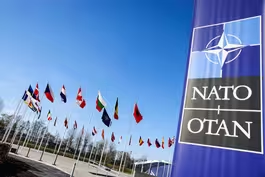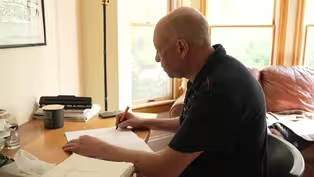
Brooks and Capehart on cluster munitions for Ukraine
Clip: 7/7/2023 | 10m 48sVideo has Closed Captions
Brooks and Capehart on cluster munitions for Ukraine, Trump's grip on Republican voters
New York Times columnist David Brooks and Washington Post associate editor Jonathan Capehart join Amna Nawaz to discuss the week in politics, including President Biden's decision to send cluster munitions to Ukraine, his upcoming trip to Europe and the Republican primary race.
Problems playing video? | Closed Captioning Feedback
Problems playing video? | Closed Captioning Feedback
Major corporate funding for the PBS News Hour is provided by BDO, BNSF, Consumer Cellular, American Cruise Lines, and Raymond James. Funding for the PBS NewsHour Weekend is provided by...

Brooks and Capehart on cluster munitions for Ukraine
Clip: 7/7/2023 | 10m 48sVideo has Closed Captions
New York Times columnist David Brooks and Washington Post associate editor Jonathan Capehart join Amna Nawaz to discuss the week in politics, including President Biden's decision to send cluster munitions to Ukraine, his upcoming trip to Europe and the Republican primary race.
Problems playing video? | Closed Captioning Feedback
How to Watch PBS News Hour
PBS News Hour is available to stream on pbs.org and the free PBS App, available on iPhone, Apple TV, Android TV, Android smartphones, Amazon Fire TV, Amazon Fire Tablet, Roku, Samsung Smart TV, and Vizio.
Providing Support for PBS.org
Learn Moreabout PBS online sponsorshipAMNA NAWAZ: To discuss this week's news, both here and abroad, we turn now to the analysis of Brooks and Capehart.
That is New York Times columnist David Brooks, and Jonathan Capehart, associate editor for The Washington Post.
Good to see you both.
JONATHAN CAPEHART: Hey, Amna.
AMNA NAWAZ: Let's begin with the news of the day, the Biden administration's decision to send these cluster munitions to Ukraine as it defends itself from Russia, just as President Biden prepares to head to the NATO summit next week.
Jonathan, we heard earlier some of the debates about why people think it's a good idea, but also the huge risk it poses to civilian populations.
Is this the Biden administration sacrificing the moral high ground for a battlefield advantage right now?
JONATHAN CAPEHART: This is war.
And President Zelenskyy, Ukrainian President Zelenskyy, is fighting or forced to fight a Russian president who's been ruthless, bombing civilian targets from almost minute one, with Zelenskyy pleading with the United States and the West, please send tanks, please send planes, please send us the most advanced military equipment you can give us, because we need it.
And so it -- sending cluster munitions is - - I think probably crosses a line for a lot of people.
But when you are the Western alliance, and the big mantra is, this is authoritarianism versus democracy, and democracy must win, well, democracy has to have all the tools possible to make it possible.
AMNA NAWAZ: David, the U.S. itself stopped using these back in 2003, right?
What does it say to you about how they see the war right now?
DAVID BROOKS: Well, I think it says a couple of things.
One, apparently, there were -- there are no other munitions to send.
And so, if that -- you have horrible choices in war, and I understand why they made the decision.
I think it says a few other things, though.
One, why do they have no other munitions to send?
What was wrong with their supply chains that they -- we don't have normal artillery shells to send?
Second, it says that the Ukraine advance is not going so great, in part because of the lack of munitions, but in part because the areas are all mined up.
And the final thing one should ask -- and I'm sure -- they're smart people over there, I'm sure they're asking this -- you look back at the history of war, people make terrible decisions thinking something that's really devastating will devastate the enemy.
And I'm thinking particularly of urban bombing in World War II of Dresden and places like that.
It had no value at all.
And so they have been fighting a war that's largely an artillery war.
Why should we think -- I'm not a military expert.
Why should we think artillery warfare is actually going to yield any advance for either side?
And so I hope they're asking these fundamental questions behind the tough decision they had to make.
AMNA NAWAZ: Jonathan, in terms of who opposes it, we have already seen even some opposition from within the president's own Democratic Party, right?
California Republican -- California Representative, rather, Sara Jacobs put out a statement opposing the U.S. sending these cluster munitions, saying: "Our international coalition is strong because we're united together and because we're living up to our values.
Sending cluster munitions defies these two tenets."
Could this signal a wider rift to come?
JONATHAN CAPEHART: Well, I mean, with all due respect to the congresswoman, she's one voice.
She might be -- there might be other members of Congress who are behind her.
And we will see as the weeks go on if more Democrats start coming out and opposing the administration, whether it is with regard to munitions or to funding.
But then my question to everyone is, well, then should the United States send the fighter jets that Zelenskyy wants?
And should the United States accept President Zelenskyy's assurances that he won't use them inside Russian territory?
I mean, these are the tough questions that David's talking about.
AMNA NAWAZ: What about at next week's NATO summit?
How do you think this issue goes down there?
We know Germany has already publicly opposed the U.S. sending these munitions.
DAVID BROOKS: Yes, I would anticipate they will publicly oppose it and then understand privately.
I imagine there may be some heartfelt opposition.
But if Zelenskyy thinks he needs them, and if there's no other way to mount the campaign, then the U.S. is in the unfortunate position of being the responsible superpower, and so we have to make the tough calls.
I do think it's going to be an important summit, in part because of the way NATO will be realigned, hopefully eventually getting Sweden in, but in part because of how Ukraine is treated.
Obviously, we can't make Ukraine a part of NATO anytime soon.
But we can and I think the hope is to offer them the sort of security guarantees that we offer something like Israel.
And so that is the gradual reshaping of the post-Ukraine war Europe, and I think the president's being pretty aggressive in probably the right way.
AMNA NAWAZ: I want to ask you back, on the 2024 campaign trail, we saw some numbers this week from campaigns, quarterly fund-raising numbers.
These are not verified by the FEC yet.
These are from the campaigns.
We should point that out.
But, Jonathan, the DeSantis campaign announced it raised $20 million since he announced his campaign six weeks ago.
There's a super PAC backing him that helped raise $130 million.
Is this money going to help him close the gap between himself and the current front-runner, former President Trump?
JONATHAN CAPEHART: Well, that's what he hopes.
And $130 million, you can do a lot with $130 million.
Donald Trump raised $35 million, double what he made in Q1.
And all of these huge numbers tell me and should tell Democrats that half the country wants one of these -- wants their guy to win or wants their candidate to win.
It's astounding that twice-impeached, twice-criminally indicted, and maybe more to come, former president is raising money hand over fist.
But with Governor DeSantis, money can only buy you so much.
And if he doesn't change the way he campaigns and is able to at least break through and have people think he's warm or human or really wants to do this, I don't see him going anywhere.
AMNA NAWAZ: David, I want to ask you about something we heard from former Vice President Mike Pence, because this is something we're seeing with a lot of the other candidates, which is having to answer for things that happened in the past.
He spent a lot of time in Iowa.
He was confronted recently by one resident who asked him why he didn't refuse to certify the 2020 election results back on January 6 in 2021.
Here's that moment.
WOMAN: Do you ever second-guess yourself?
That was a constitutional right that you had to send those votes back to the states.
It was not like you were going to personally elect him.
MIKE PENCE (R), Presidential Candidate: I'm sorry, ma'am, but that's actually what the Constitution says.
No vice president in American history ever asserted the authority that you have been convinced that I had.
But I want to tell you, with all due respect, I said before, I said when I announced President Trump was wrong about my authority that day, and he's still wrong.
AMNA NAWAZ: David, he needs the votes of the people who don't believe the last election was legitimate.
What do you make of his answer?
DAVID BROOKS: Well, he gave the right answer.
It was a true answer.
The problem they all face is that Donald Trump is not just a candidate.
He's a social club.
And my Times colleague David French made this point this week that, when you're in the Trump rally or you're in a Trump caravan or a boat, one of those boat crusades, it's fun.
They're having fun.
They're joyous.
They're around people who agree with them.
They have a beer.
And it's a sense of belonging.
And I think we have undercovered that element.
And so, for a lot of people, signing up to Donald Trump is not just this policy or that policy.
It's not an attachment to a normal political candidate.
It's a movement that provides them with a sense of belonging.
And so, despite all that happens, Donald Trump now among Republican voters has 78 percent approval.
And so that's just very high, and it's very hard to shake people off that.
And so all the candidates, Mike Pence, Ron DeSantis, who are a little Trumpy and a little anti-Trumpy, it's just not going to shake people out of their social club.
And they have to think of something else.
AMNA NAWAZ: I need to ask you both about another big ruling we saw from a federal judge this week that essentially bans the Biden administration from communicating with social media companies about misinformation or disinformation online.
We know the Biden administration is seeking an emergency order to halt that ban.
Jonathan, this comes the same week we saw a man armed to the teeth show up at the Obama residence because he saw the address posted online.
Where are we right now in this conversation between what happens in the online world and real-world violence?
(LAUGHTER) JONATHAN CAPEHART: I -- this decision boggles the mind.
You have an administration that is in the middle of a pandemic.
The Biden administration comes in, in the middle of a pandemic with disinformation, misinformation.
They're trying -- literally trying to save people's lives and see that all that misinformation and disinformation is happening on social media platforms.
A responsible, functioning government would go to those social media companies and say, hey, could we have a conversation about this?
We understand your First Amendment rights, but we're trying to save people's lives.
I don't understand how the arguments from the fever swamps have made their way into judicial decisions and are now preventing the administration from combating things that are doing real harm to the American people.
And now -- I'm glad you made the link to Mr. Taranto, the guy who was arrested outside of the Obamas' homes -- home with ammunition and guns and a machete.
And who's to say, had he not been caught, that he wouldn't have acted on that information?
AMNA NAWAZ: This is the question.
JONATHAN CAPEHART: That is the question.
And we're in a time now, Amna, where we shouldn't have to ask these questions, because I think we know what the answer would be.
AMNA NAWAZ: David, what do you think?
DAVID BROOKS: Yes, I do think we need -- obviously, they need to pull stuff down.
There are 40,000 people at Google and Meta pulling stuff down.
They have pulled over a billion things down.
I don't really trust big tech to be in charge of this, and I don't, frankly, trust government in cahoots with big tech in private to be in charge of this.
There is a law in the Senate or a bill in the Senate that would make the process more transparent, so outside sources can see if they're being honest and fair in what they pull down.
And that seems to be the best way forward.
But it is a problem for democracy to have elites in Washington and elites in Silicon Valley making decisions about what's out there.
And so that's just something we just have to wrestle with.
AMNA NAWAZ: David Brooks, Jonathan Capehart, thank you.
Good to see you both.
Please have a great weekend.
JONATHAN CAPEHART: Thanks, Amna.
DAVID BROOKS: You too.
NATO leaders to discuss revamp of military plans at summit
Video has Closed Captions
Clip: 7/7/2023 | 7m 21s | NATO leaders to discuss Ukraine support, revamp of military plans at summit (7m 21s)
Pulitzer-winning poet Carl Phillips on the power of his work
Video has Closed Captions
Clip: 7/7/2023 | 6m 8s | Pulitzer-winning poet Carl Phillips on his work and the power of poetry (6m 8s)
Rescued Ukrainian children settle back into life at home
Video has Closed Captions
Clip: 7/7/2023 | 13m 17s | Rescued Ukrainian children settle back into life at home after abduction by Russian forces (13m 17s)
U.S. decision to give Ukraine cluster bombs sparks concerns
Video has Closed Captions
Clip: 7/7/2023 | 9m 26s | Why the U.S. decision to give Ukraine cluster bombs has sparked concerns (9m 26s)
Providing Support for PBS.org
Learn Moreabout PBS online sponsorship
- News and Public Affairs

FRONTLINE is investigative journalism that questions, explains and changes our world.

- News and Public Affairs

Amanpour and Company features conversations with leaders and decision makers.












Support for PBS provided by:
Major corporate funding for the PBS News Hour is provided by BDO, BNSF, Consumer Cellular, American Cruise Lines, and Raymond James. Funding for the PBS NewsHour Weekend is provided by...



